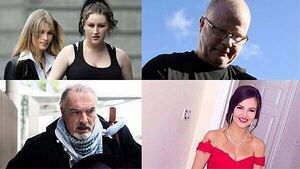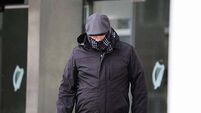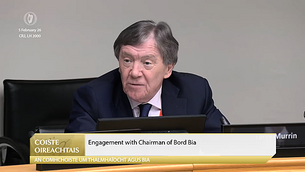When Irish crime shocked the world: Cases that broke through

Eva Osborne
Ireland has had its share of crime stories that didn’t just dominate the domestic media; they reverberated globally.
Whether because of their brutality or the mysteries surrounding them, these cases continue to fascinate, horrify and provoke debate.
From the brutal murder of Sophie Toscan du Plantier to the rise of the Kinahan cartel, Irish crimes have made headlines at home and abroad.
Here are several that have left a lasting mark.
Scissor Sisters

Linda and Charlotte Mulhall, dubbed the 'Scissor Sisters' by the media, are sisters from Dublin, who murdered and dismembered their mother's boyfriend, Farah Swaleh Noor, in March of 2005.
He was killed with a Stanley knife wielded by Charlotte and struck with a hammer by Linda following a confrontation with the sisters and their mother, Kathleen Mulhall.
The murder trial in 2006 heard that Noor’s head and penis were sliced off and the rest of his corpse dismembered and dumped in the Royal Canal in Dublin where a piece of leg, still wearing a sock, had been spotted floating near Croke Park 10 days later.
The presiding judge at the murder trial, the late Mr Justice Paul Carney, in sentencing the sisters, said it was “the most grotesque killing that has occurred in my professional lifetime.”
Sophie Toscan du Plantier

The battered body of 39-year-old French film producer Sophie Toscan du Plantier was found near her holiday home in Toormore on the outskirts of Schull in West Cork on December 23rd, 2006.
State pathologist, Dr John Harbison, found "laceration and swelling of the brain, fracture of the skull, and multiple blunt head injuries".
The facial injuries were so severe that her neighbour could not formally identify her.
Ian Bailey, who died in January 2024 at the age of 66, was the self-confessed chief suspect in the case. He was on two occasions detained by gardaí for questioning in relation to the murder.

Mr Bailey was convicted in absentia after a trial in France in 2015. He was sentenced to 25 years in prison.
However, officials in France were unable to extradite him to Paris to serve the sentence handed down by the courts.
He had denied knowing Sophie Toscan du Plantier, but several witnesses have contradicted this.
Kinahan Cartel

The Kinahan Organised Crime Group (KOCG), also known as the Kinahan Cartel, is a major Irish transnational organised crime syndicate.
The group is thought to be the most powerful in Ireland and one of the largest organised crime groups in the world.
It is also established in the UK, Spain, and the United Arab Emirates.
Founded by Christy Kinahan in the 1990s, the Kinahan Cartel's criminal activities include drug trafficking, money laundering, murder, arms trafficking, extortion, and blackmailing.
Christy Kinahan served as the direct leader of the organisation up until the position was passed on to his son Daniel.
In April 2022, the United States Department of State announced the offering of rewards of up to $5 million under the Narcotics Rewards Program for information leading to the arrest and/or conviction of Kinahan family members.
Speaking at the event, then Garda Commissioner Drew Harris said the Kinahan gang was worth more than €1 billion through its criminal enterprise.
Earlier this year, Sean McGovern (39), named by US law enforcement as a senior figure in the Kinahan cartel and who is charged with murder and directing a criminal organisation, was extradited to Ireland from the United Arab Emirates.
Kerry baby case
The discovery of the body of a baby boy at White Strand, Caherciveen, Co Kerry, in April 1984 still makes headlines today.
The baby, who later became known as 'Baby John', was found with multiple stab wounds.
An extensive investigation into the death of Baby John has been ongoing since 2018 by gardaí in the Kerry Division supported by the Garda Serious Crime Review Team.
Hundreds of people have been interviewed and over 560 lines of enquiry have been initiated.
On January 16th, 2018, gardaí announced a review into the death of Baby John following a garda apology to Kerry woman Joanne Hayes, who had been wrongly accused of his murder.
Ms Hayes had given birth to a baby boy, named Shane, on April 13th, 1984, on the family farm, but that child died of natural causes and was buried on the property.
At the time, the case raised serious questions about the culture of An Garda Síochána, and the treatment of unmarried mothers in Irish society.
Journalist Nell McCafferty wrote a book about the case titled 'A Woman to Blame'. Joanne Hayes co-wrote a book with John Barrett about her experience called 'My Story'.
Four gardaí on the case took legal action against the authors and publishers of the book, as well as shops that sold it. They received out-of-court settlements totalling over €127,000.
The killer of Baby John has never been identified.
Tina Satchwell

Richard Satchwell, who kept his wife's body in a secret grave beneath their home for six years while lying to her family and the "people of Ireland" about her disappearance, was found guilty of her murder by the unanimous verdict of a Central Criminal Court jury in May of this year.
The six-foot-two truck driver had claimed that his five-foot-four wife Tina, who weighed eight stone, had launched an attack on him with a chisel and died during a struggle in which he either lacked the intent to kill her or was acting in self-defence.
Her cause of death could not be determined due to the skeletonised nature of her remains when they were eventually uncovered.
The jury however, unanimously rejected his defence and agreed with the State's case that Satchwell was a "cunning" murderer whose claims were "nonsense" and had hidden his wife's body to ensure a cause of death would not be available.
Satchwell had pleaded not guilty to murdering 45-year-old Tina Satchwell - nee Dingivan - at their home address at Grattan Street, Youghal, Co Cork between March 19th and March 20th, 2017, both dates inclusive.

There were three verdicts the jury panel could return in relation to the murder charge against him namely; guilty of murder, not guilty of murder but guilty of manslaughter or not guilty.
The five men and seven women disagreed with the defence position that, although Satchwell had lied "to the people of Ireland", the lies did not make him a murderer or relieved the prosecution of the burden of proving the ingredients of murder.
The jury had watched video clips of a tearful Richard Satchwell making televised appeals for Tina to come home, months after he murdered her and buried her in a grave dug almost one metre deep beneath their Cork home.
The jurors agreed with the prosecution case that Satchwell's narrative of how his wife died - the only account of her death they were given - after he held her off by the belt of her bathrobe was "absolutely farcical" and had "more holes in it than a block of Swiss cheese".
Ashling Murphy

23-year-old Ashling Murphy was murdered on January 12th, 2022, by 35-year-old Jozef Puska.
Puska repeatedly stabbing her in the neck after attacking her while she exercised along the canal towpath outside Tullamore, Co Offaly.
A few months ago, Jozef Puska’s two brothers and their wives were convicted of withholding crucial information about the murder of the school teacher Ashling Murphy.
The wives of the brothers, Gaziova and Grundzova, burned Puska's clothes to impede his arrest or prosecution.
All the defendants had pleaded not guilty to all of the charges during the four-week trial.
Lubomir Jnr however, had admitted to gardaí that he lied in his initial statement, while his wife Viera and sister-in-law Jozefina told gardaí that they had burned clothes.
Puska’s sentence reopened conversations from when Ms Murphy was killed about how many women perceive men in general to be a threat to their safety, particularly women who are out, alone, jogging, as Ashling Murphy was when Puska’s took her life.
People across Ireland responded with shock and grief to the news of Murphy's murder. In Tullamore, thousands of mourners attended a vigil in a local park.
Numerous other vigils took place throughout the country, in locations including Dublin, Galway, Belfast, Limerick, Cork, Waterford, Kilkenny, Navan, Maynooth, Drogheda, Sligo, Ballina, Derry, Omagh, and Armagh.
Vigils were also held internationally in cities including London, New York, Toronto, Vancouver, Melbourne, Brisbane, Dubai, Glasgow, and Edinburgh. Tens of thousands of people attended vigils throughout Ireland and abroad.





